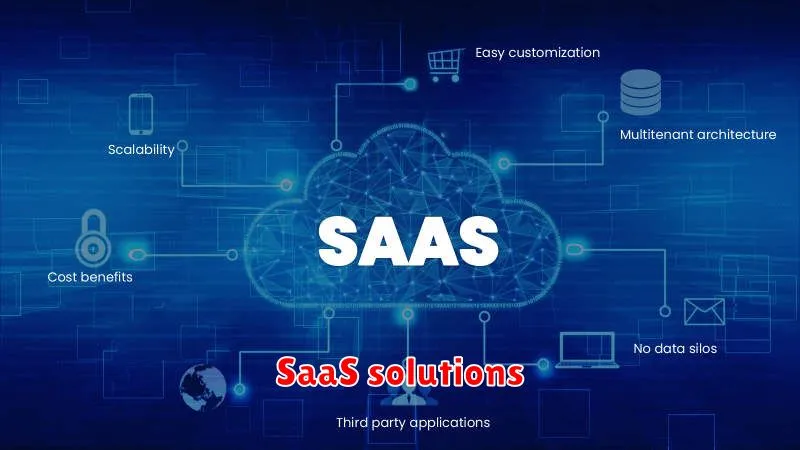Launching a startup is an exciting but daunting task, demanding careful planning and execution. One crucial aspect often overlooked is selecting the right software solutions. With the abundance of Software-as-a-Service (SaaS) options available, choosing the perfect tools for your startup’s unique needs can feel overwhelming. This comprehensive guide will equip you with the knowledge and strategies to navigate the SaaS landscape and pick the power tools that will propel your startup to success.
From project management and communication to marketing automation and customer relationship management (CRM), the right SaaS solutions can streamline operations, boost productivity, and enhance your overall efficiency. This article will delve into essential considerations when choosing SaaS tools, including factors like budget, scalability, integration capabilities, and user-friendliness. By understanding these key aspects, you’ll be able to make informed decisions and build a robust software infrastructure that supports your startup’s growth trajectory.
Understanding the SaaS Advantage for Startups
In today’s competitive landscape, startups need every edge they can get to thrive. One significant advantage is embracing the power of Software-as-a-Service (SaaS). SaaS solutions offer startups a unique opportunity to leverage powerful tools and resources without the burden of traditional software infrastructure and maintenance.
The key benefit of SaaS is its scalability. Startups can easily scale their operations up or down as their needs evolve, without the need for significant upfront investments in hardware, software, and IT personnel. This flexibility is crucial for startups operating on tight budgets and facing rapid growth.
Another advantage is cost-effectiveness. SaaS solutions offer a subscription-based model, eliminating the need for costly licenses and software upgrades. This predictable pricing model makes budgeting easier and allows startups to allocate their resources more effectively.
Moreover, SaaS solutions come with built-in features, including security, updates, and support. Startups can focus on their core business without worrying about managing complex IT infrastructure or dealing with software vulnerabilities.
In conclusion, embracing SaaS solutions can give startups a significant competitive advantage. By leveraging the scalability, cost-effectiveness, and built-in features of SaaS, startups can streamline operations, optimize resource allocation, and focus on their growth strategy.
Key SaaS Solutions to Consider for Early-Stage Startups
Starting a business is an exciting adventure, but it also comes with a lot of moving parts. From managing finances to collaborating with your team, you need the right tools to keep your operations running smoothly. That’s where SaaS solutions come in. SaaS (Software as a Service) provides you with powerful tools without the need for complicated installations or expensive hardware.
When you’re just starting out, choosing the right SaaS tools is crucial. You need solutions that are affordable, easy to use, and provide the essential features you need to grow. Here are some key SaaS solutions to consider for your early-stage startup:
1. Project Management:
Keeping your projects on track is essential for any startup. SaaS project management tools like Asana, Trello, or ClickUp can help you organize tasks, assign responsibilities, and track progress. These tools are great for keeping everyone on the same page and ensuring that deadlines are met.
2. Communication & Collaboration:
Effective communication is vital for a startup. Slack, Microsoft Teams, or Zoom are excellent tools for keeping your team connected. They allow for instant messaging, video conferencing, and file sharing, making it easy to collaborate and stay in touch with remote team members.
3. Customer Relationship Management (CRM):
A CRM is essential for managing your customer relationships. HubSpot, Zoho CRM, or Pipedrive can help you track leads, manage customer interactions, and nurture your sales pipeline. A robust CRM will help you understand your customers better and ultimately improve your sales.
4. Email Marketing:
Email marketing is a powerful way to engage with your audience and build relationships. Mailchimp, ConvertKit, or ActiveCampaign are popular email marketing platforms that allow you to create professional emails, segment your audience, and track your results. These tools can help you effectively communicate with your customers and promote your products or services.
5. Accounting & Finance:
Keeping track of your finances is essential for any business, especially in the early stages. Xero, QuickBooks Online, or FreshBooks are popular cloud-based accounting solutions that can help you manage your invoices, track expenses, and generate financial reports. These tools are perfect for small businesses that need a simple and reliable accounting solution.
Remember, the best SaaS solutions for your startup will depend on your specific needs and budget. It’s worth researching and testing out different tools before making a commitment. The right SaaS solutions can empower your startup and help you achieve your goals.
CRM and Sales Automation: Supercharge Your Sales Pipeline
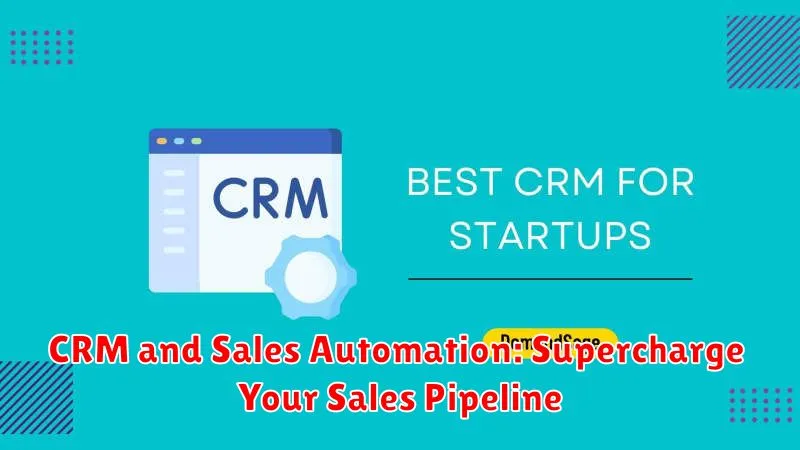
A strong sales pipeline is essential for any startup’s success. It’s the lifeblood of your business, driving revenue and fueling growth. But managing a sales pipeline can be challenging, especially in the early days when resources are limited and time is precious. This is where CRM and sales automation solutions come into play.
A CRM (Customer Relationship Management) system is a powerful tool for organizing and managing your customer data. It allows you to track interactions, manage leads, and nurture relationships, creating a centralized hub for all your customer information. With a CRM, you can easily segment your audience, identify your most promising leads, and prioritize your sales efforts.
Sales automation takes things a step further, streamlining repetitive tasks and automating processes to free up your sales team’s time for more strategic activities. From sending automated follow-up emails to scheduling appointments, sales automation can help you manage your pipeline efficiently and effectively.
By integrating a CRM and sales automation solution, you can gain several advantages:
- Improved lead management: Automatically capture leads, qualify them based on pre-defined criteria, and route them to the appropriate sales representatives.
- Enhanced communication: Automate email campaigns, send personalized messages, and track email engagement to nurture leads effectively.
- Increased efficiency: Automate repetitive tasks, freeing up your sales team to focus on high-value activities like closing deals.
- Data-driven insights: Gain valuable insights into your sales performance, identify trends, and optimize your strategies.
By investing in a CRM and sales automation solution, you can empower your sales team, improve lead generation, and supercharge your sales pipeline. This will give your startup the competitive edge it needs to thrive in today’s fast-paced market.
Project Management Software: Keeping Your Team in Sync
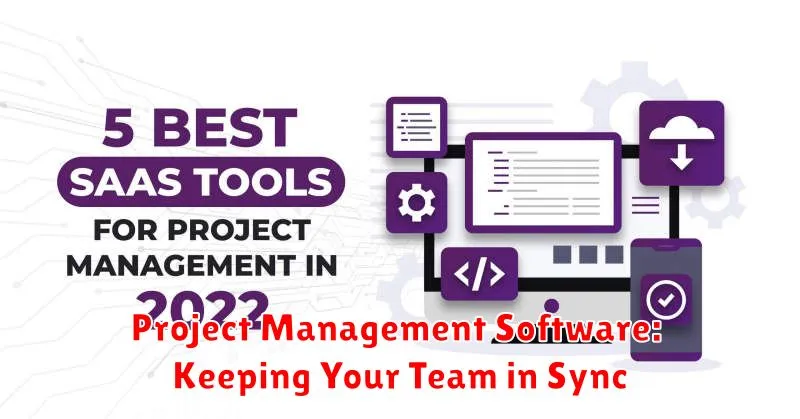
Launching a startup is an exciting but chaotic endeavor. With so many moving parts and a rapidly evolving landscape, it’s crucial to have the right tools in place to keep your team organized and on track. Project management software is an essential SaaS solution that provides a central hub for collaboration, task management, and communication, ensuring your team stays in sync and your project stays on schedule.
Choosing the right project management software can be daunting with so many options available. Here are some key factors to consider:
- Team Size and Structure: Different software solutions cater to teams of varying sizes and structures. Consider the number of users, team hierarchy, and communication needs.
- Project Complexity: If your projects are simple, a basic project management tool might suffice. But for more complex projects involving multiple stakeholders and deadlines, a more robust solution with features like Gantt charts and resource management is recommended.
- Integration with Other Tools: Look for software that integrates with other tools you use, like CRM, accounting, and communication platforms. This helps streamline workflows and eliminate data silos.
- Ease of Use: Choose software that is intuitive and easy to navigate, even for team members who aren’t tech-savvy. The software should be user-friendly and help enhance productivity, not hinder it.
- Budget: Project management software comes with varying pricing models, from free plans to premium subscriptions. Determine your budget and choose a solution that offers the features you need without breaking the bank.
By selecting the right project management software, your startup can benefit from:
- Improved Communication: Centralized communication channels streamline communication, reduce confusion, and ensure everyone is on the same page.
- Enhanced Collaboration: Team members can easily collaborate on tasks, share files, and provide feedback in real-time, fostering a sense of teamwork and accountability.
- Increased Efficiency: Task management features help organize, prioritize, and track progress, leading to increased efficiency and productivity.
- Better Project Visibility: Project dashboards provide a clear overview of project status, timelines, and progress, allowing for informed decision-making.
- Reduced Risk: Clear communication, task delegation, and progress tracking minimize the risk of project delays and miscommunication.
Investing in the right project management software is a crucial step for any startup looking to achieve success. By keeping your team in sync and organized, you can unleash your startup’s full potential and achieve your goals faster and more efficiently.
Communication and Collaboration Tools: Streamlining Teamwork

As you launch your startup, smooth communication and seamless collaboration are paramount. This is where communication and collaboration tools come in. These powerful platforms act as the backbone of your team’s workflow, enabling effective communication, task management, and efficient project execution.
From instant messaging to project management software, a wide array of tools can significantly streamline your team’s efforts. Choosing the right tools can make a world of difference in your startup’s success.
Here are some key features to consider when selecting communication and collaboration tools:
- Real-time Communication: Platforms like Slack, Microsoft Teams, or Google Chat facilitate instant messaging, voice and video calls, allowing for quick discussions and problem-solving.
- Task Management: Tools like Asana, Trello, or Monday.com provide project boards, task lists, and deadlines for efficient task assignment and progress tracking.
- File Sharing and Collaboration: Platforms like Google Drive, Dropbox, or Microsoft OneDrive allow for secure file sharing, document collaboration, and version control, ensuring all team members have access to the latest information.
- Integrated Features: Look for tools that offer integrations with other software you use, such as CRM, marketing automation, or accounting systems, for a unified workflow.
By choosing the right combination of communication and collaboration tools, your startup can build a strong foundation for efficient teamwork, streamlining workflows, and ultimately, achieving your business goals.
Marketing Automation: Reaching the Right Audience
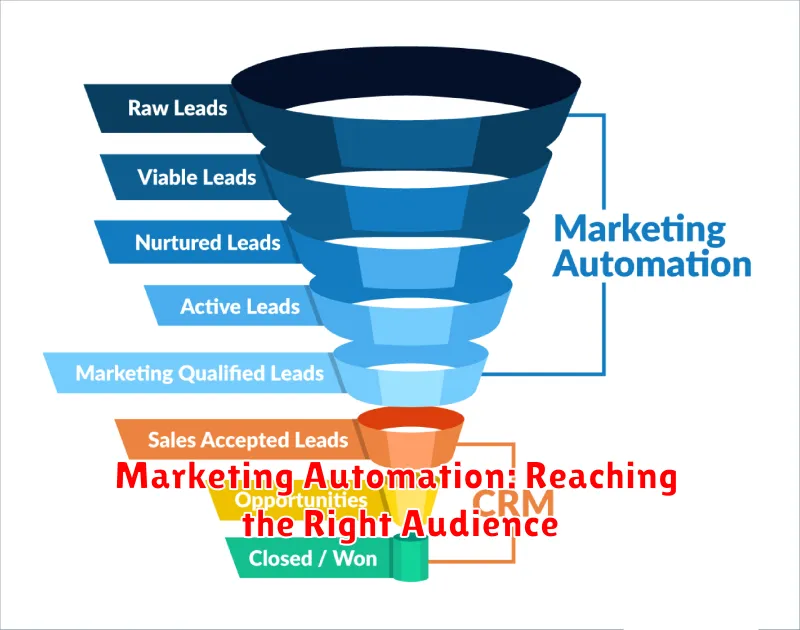
As a startup, getting your brand and product in front of the right audience is crucial for success. With limited resources, it’s essential to maximize your reach and impact. Marketing automation can be a powerful tool for achieving this goal.
Marketing automation platforms enable you to automate repetitive tasks, such as email campaigns, social media posting, and lead nurturing. By automating these processes, you free up time to focus on strategic initiatives that drive growth. But the real magic lies in its ability to segment your audience and personalize your messaging.
Here’s how marketing automation helps you reach the right audience:
- Lead Scoring and Segmentation: Analyze user data to identify potential customers with the highest likelihood of conversion. Segment your audience based on demographics, interests, and engagement, allowing you to tailor your messaging for maximum impact.
- Personalized Email Campaigns: Create dynamic email sequences that adapt to individual preferences and behavior. Trigger emails based on specific actions, such as website visits or abandoned carts, ensuring relevant and timely communication.
- Automated Social Media Engagement: Schedule and optimize your social media posts to reach your target audience at the right time. Analyze data to identify trending topics and tailor your content accordingly.
By leveraging marketing automation, you can nurture leads, build relationships, and drive conversions. The key is choosing the right platform that aligns with your specific needs and goals. Consider factors such as budget, integration capabilities, and ease of use.
Remember, marketing automation is not a magic bullet. It’s a powerful tool that, when used strategically, can help you reach the right audience and propel your startup to success.
Cloud Storage and File Sharing: Secure and Scalable Solutions
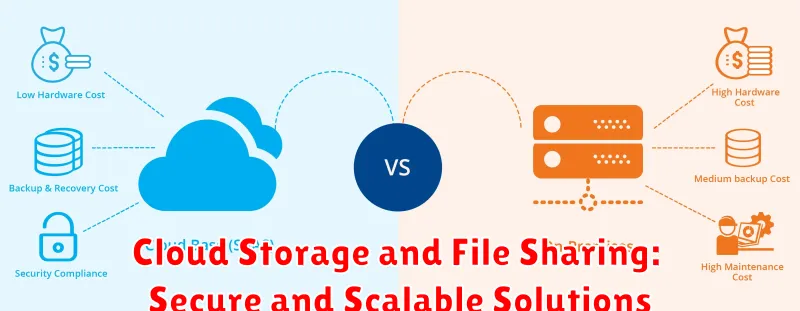
As your startup grows, managing your files and data becomes increasingly crucial. This is where cloud storage and file sharing solutions come into play, offering a secure and scalable way to store, access, and collaborate on your data from anywhere.
Cloud storage provides a centralized location for storing all your important files. You don’t need to worry about buying and maintaining your own servers, as the cloud provider handles everything for you. This frees up your team to focus on other aspects of your business.
File sharing solutions make it easy for your team to collaborate on documents, share files with clients, and access information from any device. With features like version control, real-time editing, and file sharing permissions, you can ensure your data is safe and accessible to the right people.
When choosing a cloud storage and file sharing solution, consider factors like:
- Security: Ensure the provider uses encryption and other measures to protect your data from unauthorized access.
- Scalability: The platform should be able to grow with your business, accommodating increasing storage needs.
- Features: Look for features that meet your specific needs, such as version control, real-time editing, and collaboration tools.
- Integrations: Choose a solution that integrates seamlessly with your other business tools.
- Cost: Evaluate pricing plans and choose a solution that fits your budget.
By choosing the right cloud storage and file sharing solution, you can streamline your file management processes, enhance collaboration, and ensure your data is secure and accessible. This will allow you to focus on building your business and achieving your goals.
Financial Management Software: Staying on Top of Your Finances

As a startup, staying on top of your finances is crucial for survival and growth. Financial management software, or FMS, plays a vital role in this process. With the right FMS, you can streamline your accounting, automate tasks, generate reports, and gain valuable insights into your business performance.
Key features to look for in FMS for startups include:
- Expense tracking: Efficiently track and categorize expenses, including invoices, receipts, and subscriptions.
- Invoicing and billing: Create and send professional invoices, manage payments, and track outstanding balances.
- Reporting and analytics: Gain clear insights into your cash flow, profitability, and other key financial metrics.
- Bank reconciliation: Automate bank statement reconciliation to ensure accurate financial records.
- Budgeting and forecasting: Plan your future financial performance and track against your goals.
Choosing the right FMS can be overwhelming. Here are some tips:
- Consider your specific needs: Evaluate your business’s size, complexity, and industry.
- Look for scalability: Choose a solution that can grow with your business.
- Evaluate integrations: Check if the FMS integrates with other essential tools like your CRM, payroll system, or e-commerce platform.
- Compare pricing models: Consider subscription fees, transaction fees, and other costs.
- Read reviews and testimonials: Gain insights from other users.
By investing in a robust financial management software, you can empower your startup with the tools necessary to achieve financial stability and success.
Customer Support and Helpdesk Solutions: Building Strong Relationships
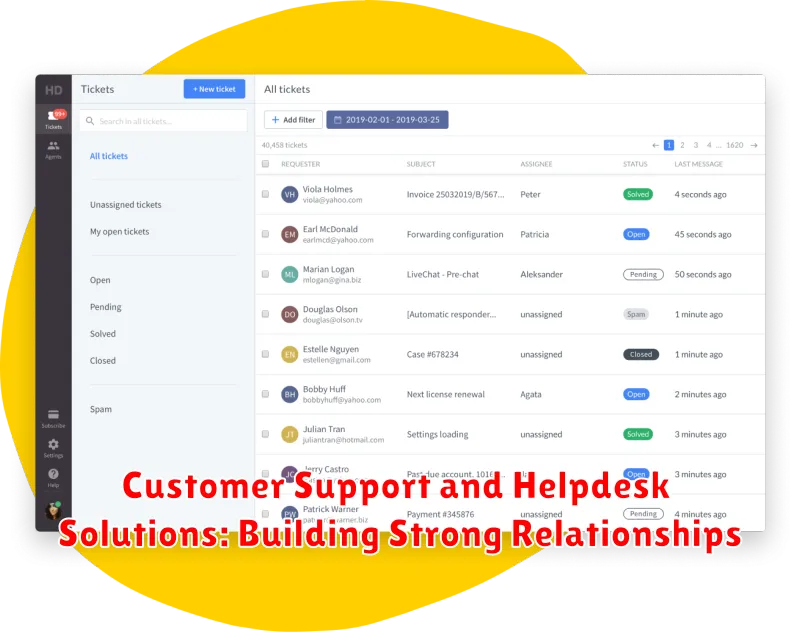
In the dynamic world of startups, customer satisfaction is paramount. A robust customer support and helpdesk solution is essential for fostering strong customer relationships, building trust, and driving growth. Choosing the right SaaS solution can streamline operations, enhance communication, and empower your team to deliver exceptional service.
Key Considerations for Choosing a Customer Support and Helpdesk Solution
- Scalability: Select a solution that can grow with your startup. Ensure it can handle increasing customer volume and ticket complexity.
- Ease of Use: Choose a user-friendly platform that is intuitive for both your team and customers.
- Integrations: Look for a solution that seamlessly integrates with other essential SaaS tools like your CRM, email marketing platform, and project management system.
- Features and Functionality: Consider features like live chat, knowledge base creation, automated responses, reporting and analytics, and multi-channel support.
- Pricing and Value: Evaluate pricing models, including per-agent pricing, per-seat pricing, and tiered pricing. Choose a solution that offers value for your budget.
Benefits of Implementing a Customer Support and Helpdesk Solution
- Improved Customer Satisfaction: Faster response times, personalized interactions, and efficient issue resolution contribute to a positive customer experience.
- Increased Efficiency: Automate repetitive tasks, streamline workflows, and empower agents with a centralized knowledge base.
- Data-Driven Insights: Gain valuable insights into customer behavior, common issues, and areas for improvement through reporting and analytics.
- Enhanced Team Collaboration: Foster seamless communication and collaboration among support agents and other team members.
Popular Customer Support and Helpdesk Solutions
The market offers a wide range of customer support and helpdesk solutions. Some popular options include:
- Zendesk: A comprehensive platform with advanced features, excellent integrations, and strong customer support.
- Freshdesk: Known for its user-friendly interface, robust automation features, and affordable pricing.
- Intercom: Focuses on customer engagement with live chat, in-app messaging, and targeted campaigns.
Conclusion
A robust customer support and helpdesk solution is an essential investment for startups. By carefully considering your needs, exploring various options, and choosing the right solution, you can build strong customer relationships, enhance operational efficiency, and drive sustainable growth.
HR and Payroll Solutions: Managing Your Growing Team
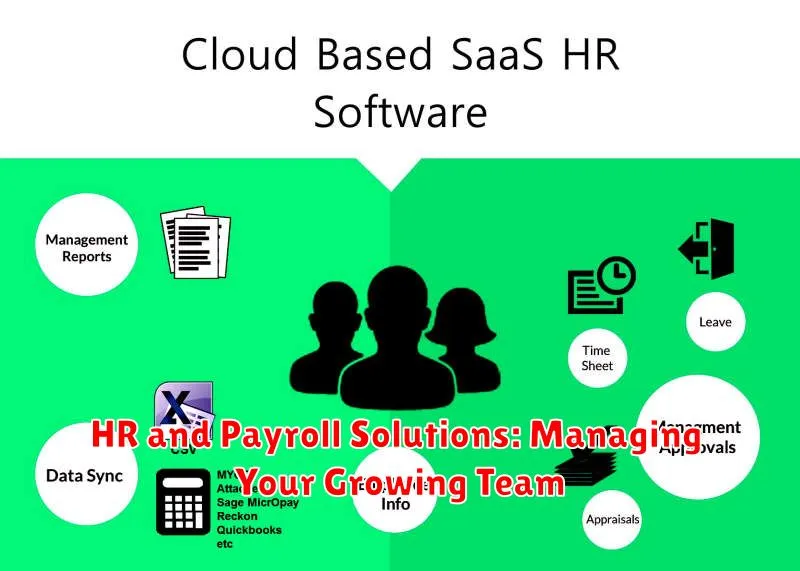
As your startup begins to scale, managing your team’s growth becomes increasingly crucial. HR and payroll solutions are essential tools to streamline administrative processes, ensure compliance, and foster a positive work environment for your growing team. Let’s explore how these solutions can empower your startup:
HR Software automates many aspects of HR, from recruiting and onboarding to performance management and employee engagement. This frees up your time to focus on strategic initiatives. The right HR software will allow you to:
- Simplify Recruitment and Onboarding: Automate job postings, track applications, and streamline the onboarding process with centralized documentation and employee communication.
- Manage Employee Records and Data: Maintain accurate employee information, including contact details, benefits, and performance reviews, all in one secure platform.
- Streamline Performance Management: Set performance goals, conduct regular reviews, and provide feedback to your team effectively.
- Boost Employee Engagement: Offer employee self-service portals for access to payroll information, benefits, and company resources, fostering a sense of autonomy.
Payroll Software automates the complex process of calculating and distributing paychecks, ensuring accuracy and timely payments. This eliminates manual calculations and reduces the risk of errors. Key features to look for include:
- Automated Tax Calculations and Deductions: Stay compliant with ever-changing tax regulations and automatically calculate payroll taxes, withholdings, and deductions.
- Direct Deposit and Payment Options: Offer employees convenient payment methods, such as direct deposit or electronic checks.
- Time and Attendance Tracking: Manage employee hours accurately and prevent time theft with integrated time and attendance tracking features.
- Reporting and Analytics: Gain insights into payroll costs and trends, helping you make informed decisions about compensation and benefits.
Choosing the right HR and payroll solutions can be a significant investment, but it’s a worthwhile one. By automating these critical processes, you can free up your time, enhance efficiency, and create a thriving work environment for your team. As your startup grows, these solutions will be invaluable in supporting your HR and administrative needs.
Choosing the Right SaaS Solutions for Your Startup’s Needs
In the dynamic world of startups, choosing the right SaaS solutions is crucial for success. With a multitude of options available, it can be overwhelming to navigate the landscape and identify the tools that perfectly align with your startup’s specific needs. This guide will provide a framework for evaluating SaaS solutions and selecting the best fit for your journey.
First, define your core business functions. What are the critical areas that require software support? Identify your key needs, such as customer relationship management (CRM), project management, accounting, marketing automation, and communication tools.
Next, consider your startup stage. Are you in the ideation phase, early-stage growth, or scaling up? The stage of your startup will influence the features and functionality required from SaaS solutions.
It’s essential to analyze your budget constraints. SaaS solutions come with varying pricing models, from fixed monthly subscriptions to usage-based pricing. Establish a budget range and explore options within that limit.
Prioritize integration capabilities. The ability to seamlessly integrate SaaS solutions with existing systems is crucial to avoid data silos and streamline workflows. Look for solutions that offer robust APIs and compatible integrations.
Finally, don’t overlook user experience and support. Choose solutions with intuitive interfaces, comprehensive documentation, and reliable customer support. A user-friendly experience and prompt assistance will contribute to your startup’s efficiency and success.
By following these steps, you can choose SaaS solutions that empower your startup, streamline operations, and drive growth. Remember, the right tools can be the difference between a successful launch and a missed opportunity.
Factors to Consider When Evaluating SaaS Providers
Choosing the right SaaS solutions is critical for any startup looking to scale effectively. With numerous options available, it’s essential to evaluate providers carefully based on your specific needs. Here are some crucial factors to consider:
1. Functionality and Features: Start by identifying the core functionalities you need. Does the SaaS provider offer the features you require to streamline your operations, manage your data, and achieve your business goals?
2. Integration Capabilities: Ensure the SaaS solution integrates seamlessly with your existing tools and systems. This will prevent compatibility issues and ensure smooth data flow.
3. Scalability and Performance: Consider your future growth plans. Choose a provider that offers scalability to handle increasing workloads and data volumes without compromising performance.
4. Security and Compliance: Data security is paramount. Research the provider’s security measures, certifications, and compliance with industry standards.
5. Pricing and Value: Compare pricing models, consider different plans, and determine the overall value proposition. Look for a balance between cost and the features you receive.
6. Customer Support and Documentation: Efficient customer support is essential. Evaluate the provider’s response times, availability of documentation, and the quality of their support channels.
7. User Experience: User-friendliness is crucial for team adoption. Consider the platform’s interface, ease of navigation, and overall usability.
By carefully considering these factors, you can choose SaaS providers that align with your startup’s needs and pave the way for a successful launch and sustainable growth.
Integration Capabilities with Existing Systems
As your startup grows, you’ll likely need to integrate your new SaaS solutions with existing systems. This is crucial for maintaining data consistency, automating workflows, and creating a seamless experience for your team. When evaluating SaaS solutions, prioritize those with robust integration capabilities. Look for features such as:
- APIs (Application Programming Interfaces): APIs enable different software systems to communicate and exchange data. A well-documented API will make it easier for developers to integrate your new SaaS solutions with your existing infrastructure.
- Pre-built Integrations: Some SaaS providers offer pre-built integrations with popular tools like CRM, accounting, and marketing platforms. This can significantly speed up the integration process.
- Integration Platforms as a Service (iPaaS): iPaaS platforms provide a central hub for managing and orchestrating integrations. They can simplify the process of connecting multiple systems and ensure data flows smoothly.
By prioritizing integration capabilities, you’ll ensure your SaaS solutions work seamlessly with your existing systems. This will save you time, money, and headaches in the long run, allowing you to focus on growing your startup.
Scalability and Pricing Models for Growth
As your startup scales, you need SaaS solutions that can grow with you. Look for solutions with flexible pricing models that adapt to your evolving needs. Consider pay-as-you-go options for cost control and volume discounts as your user base expands. Make sure your chosen SaaS solutions offer scalable infrastructure to handle increasing traffic and data demands.
Don’t forget about the pricing models themselves. Options like tiered pricing can offer different feature sets based on your usage, while subscription-based models provide predictable costs. Choose a model that aligns with your business goals and allows you to optimize for growth.
Remember, scalability is essential for long-term success. Choose SaaS solutions that provide the foundation for your startup’s growth. Invest in solutions that offer flexible pricing and robust infrastructure to ensure smooth scaling as you reach new heights.
Security and Data Privacy Measures
Data security and privacy are paramount when choosing SaaS solutions for your startup. You need to ensure that your sensitive information is protected and that the chosen platforms comply with relevant regulations like GDPR and CCPA. Look for providers that offer strong security features like:
- Data encryption: Both in transit and at rest.
- Two-factor authentication: To prevent unauthorized access to your accounts.
- Regular security audits: To identify and address potential vulnerabilities.
- Access controls: To restrict user permissions and prevent data leaks.
- Data backups: To safeguard your data from accidental loss or cyberattacks.
In addition to security measures, consider the provider’s approach to data privacy. Ask about their policies on data collection, storage, and use. Ensure that they comply with applicable privacy regulations and have transparent policies regarding data sharing and deletion.
By prioritizing security and data privacy from the start, you can build a solid foundation for your startup’s success and protect your valuable data from potential risks.
Making the Most of Your SaaS Investments
You’ve carefully chosen the SaaS solutions that will power your startup, but getting the most out of these investments goes beyond simply signing up. It’s about maximizing their value and making them an integral part of your success. Here are some key strategies for making the most of your SaaS investments:
1. Integration is Key: Connecting your different SaaS tools seamlessly can streamline your workflow, eliminate redundancies, and improve data accuracy. Look for platforms that offer robust integration capabilities or use integration tools like Zapier to connect your solutions. This helps you avoid data silos and ensures a smooth information flow across your business.
2. Leverage Automation: SaaS tools are designed to automate repetitive tasks, freeing up your team for more strategic work. Identify processes that can be automated, and explore the features and functionalities your chosen tools offer. Automating tasks like email marketing, social media scheduling, or data entry can significantly improve efficiency and productivity.
3. Embrace Data-Driven Decisions: SaaS solutions provide access to valuable data insights that can inform your business decisions. Take advantage of built-in analytics dashboards and reports to track key performance indicators (KPIs) and understand how your business is performing. Use this data to identify areas for improvement and make informed decisions about your growth strategy.
4. Foster User Adoption: The success of your SaaS investments depends on user adoption. Train your team effectively on the functionalities and benefits of each tool. Encourage their feedback and make adjustments based on their needs. A well-trained and engaged workforce will maximize the value of your SaaS solutions.
5. Regularly Review and Optimize: The SaaS landscape is constantly evolving, so it’s important to review your subscriptions and functionalities periodically. Are you still utilizing all the features of each tool? Are there more affordable alternatives available? Make adjustments as needed to ensure you’re getting the most value for your investment.
By following these strategies, you can transform your SaaS investments from mere expenses to powerful engines for growth and success. Remember, your chosen SaaS solutions are valuable tools that can help you achieve your startup goals. Use them wisely, and you’ll be well on your way to building a thriving business.

